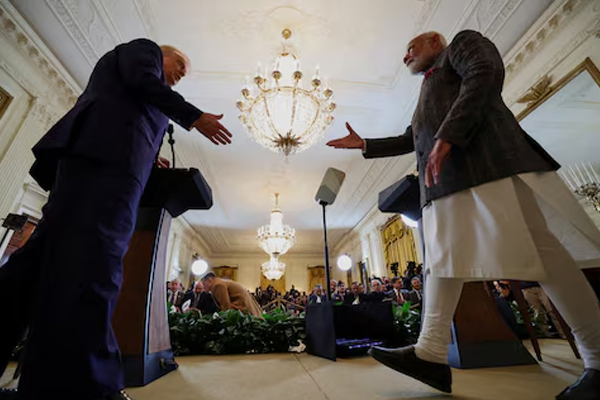
India and the United States were on the “cusp of signing an ambitious” trade deal, however Operation Sindoor – India’s military intervention against Pakistan – and the role by Washington during the 96-hour conflict derailed the signing of the pact, according to Nisha Biswal, Partner, The Asia Group and former Assistant Secretary at the US State Department.
Speaking exclusively with StratNewsGlobal from Washington DC over videoconferencing, Biswal said, business and investors in both India as well as in the US will “take a hit” if two-way trade between US and India takes a backseat.
“I think that in the recent crisis on India and Pakistan, the fact that Pakistan, on the one hand, acknowledged role for the United States and for President Trump and India kind of minimised it probably did not sit well with the administration,” said Biswal.
Additionally, she said, one of the main reasons why the US-India BTA hit a roadblock was due to the fact that unlike in India’s case, the US President Donald Trump has acted as the “negotiator-in-chief” even as he himself got engaged in signing similar trade pacts with the European Union (EU), Japan, Korea and others.
“The administration had concluded what it could at a working level. But ultimately, the president of the United States feels like he is the negotiator in chief. He had played a direct role in bringing deals across the finish line with the EU, with Japan, with Korea, with Vietnam. And it seemed like the Indian side was unwilling to have the conversation at the leader level,” she added.
According to Biswal, President Trump sought to “have more concessions in play” in agriculture and dairy products.
“Now, in the midst of all of this, you know, the U.S.’ dynamic with Russia has been evolving. And, as the US puts more pressure on Russia to conclude and reach some sort of a closure to the conflict with Ukraine, India came in the crosshairs with respect to the energy imports from Russia.
“All (these factors) combined in a very unfortunate and unhelpful way to sideline what I had hoped was going to be really a game changer in terms of the economic partnership between the United States and India,” she underscored.
India-US Tensions
Biswal, who served as Deputy CEO of the U.S. International Development Finance Corporation, is of the opinion that there exists an “underlying tension” between both the countries that did not allow the trade agreement to go through smoothly.
“The fact that neither the (US-India) strategic partnership nor the trade agreement that was on offer were sufficient to kind of carve the path forward points to the fact that there’s an underlying tension there that got in the way,” said Biswal.
“These are two individuals (Trump and Modi) who are strong leaders, who are very attentive to their own politics. I think Donald Trump is extraordinarily focused on domestic politics and domestic issues and how things play and is playing for that audience.
“And I think Narendra Modi is also very much attuned to the needs and the sentiments of the Indian population, of his base and of where the criticisms are across the political spectrum,” she said adding, which is adding on to the tensions and preventing a conciliatory approach.
Trade Deal Needed
According to Biswal, despite all the ongoing tensions between the US and India that began after Trump labelled India as a “dead economy”, Washington is still keen to have the trade pact with India.
“United States ultimately wants to have a deal with India. I don’t think it’s in the US interest to not have a trade deal with India. The question is the terms by which that becomes possible. And it’s not about the terms of the deal itself. It’s about the terms of the negotiations or the optics,” she said.
She also said, “Until there is some kind of an understanding at the leader level, it is not likely to come to pass … I think that if there’s a win-win equation that can be eked out for a leader level conversation, then I think we will see progress…I think if both leaders are in a position where they’re not willing to make a conciliatory gesture towards the other, then I think the impasse continues.”
During her conversations with US-based companies and investors, Biswal said, she has found out how keen they are to have a deepening of economic ties with India. She stressed that India needs to look at US-based companies as its partners and be willing to work with them in pushing the BTA across the finishing line.
“Can the US economy survive a cooling off of trade with India? Of course, it can. Can the Indian economy survive? Yes, it can. But both economies will take a hit. And, businesses in both countries will be disadvantaged. And consumers in both countries will take a hit. So it’s not in anyone’s interest. And especially if you start looking at additional sectors, as the President has indicated, including pharma. This really is jumping off a cliff in some ways, and, without a parachute,” she stressed.
Biswal added, “US businesses would like to see lowering of tariffs, lowering of barriers and real deepening of that economic corridor between the US and India. They certainly don’t want to see the imposition of tariffs … I would not want India to be left out of a trade agreement. I think that that would be deeply damaging for U.S. businesses, they want to see deeper trade ties across the board.”




